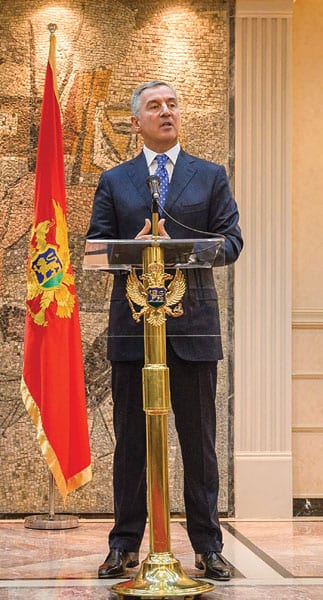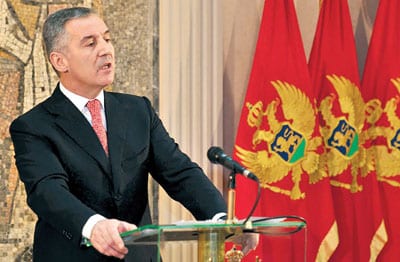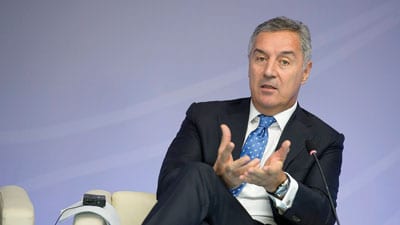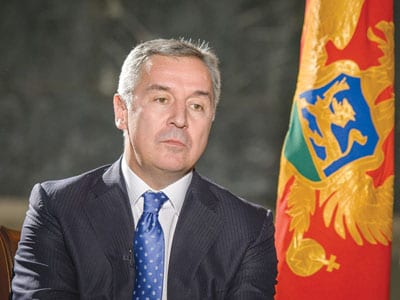The strong progress made by Montenegro since the restoration of independence in building democratic institutions and the modern economic environment – within the framework of EU and Euro-Atlantic integration – now obliges that the government takes on more ambitious goals: the creation of the preconditions for sustainable and dynamic economic growth and increasing employment
Montenegro this year celebrates ten years since the restoration of independence: it has used this time to create strong space for European and Euro-Atlantic integration and almost completely restructure its economy, making it more effective and attractive for foreign investors.
In this interview, Montenegrin Prime Minister Milo Djukanović summarises the progress made in the past decade, the challenges of coexistence in the Balkans and the importance of security in the region in the European context, as well as discussing the government’s priorities in the coming period. This is, first and foremost, further progress towards EU membership, as the basis for building a modern set of values in Montenegrin society – strengthening democracy, respecting human rights and the rule of law – which is a prerequisite for the growth of the prosperity of society and the well-being of every citizen of Montenegro.
“Montenegro’s progress towards NATO membership is important not only for us and for our security, and a more secure European future, but also for the Balkans, the entire Mediterranean area and stability in Europe,” says Đukanović. “This progress will be an incentive for us to more decisively carry out reforms on the path towards EU accession and messages of encouragement for all countries aspiring for membership”.
If you had to sum up the positive and negative sides of the decade of Montenegrin independence, what would you highlight?
In the last ten years since the restoration of independence Montenegro has taken a huge step forward in terms of strengthening democratic institutions and reinforcing the rule of law, which has had a direct impact on strengthening the competitiveness of the economy.

Consequently, we had a huge inflow of foreign direct investment worth about 19 per cent of GDP annually on average, which provided the basis for economic growth. GDP per capita in Montenegro, measured by purchasing power parity, increased from 30 per cent of the EU average in 2006 to 41 per cent in 2015, which is the highest in the region of the Western Balkans.
Average net salaries and pensions are also the highest in the region. All of this was achieved in the context of the most remarkable events after the restoration of independence: the opening of EU membership negotiations and dynamic progress in that process, as well as obtaining an invitation for membership in NATO.
In a negative context I would mention the effects of the devastating global economic crisis, given that it began three years after the restoration of our independence, and we can still feel its consequences today, particularly in terms of the insufficient liquidity of the economy, a still-high proportion of non-performing loans within total loans and high unemployment.
What do you consider as the most important goals Montenegro should achieve in the next decade?
The most important goal for the next decade is to bring the quality of life of the citizens of Montenegro closers to that of the EU, with the assumption that Montenegro will become a member of both NATO and the EU. In order for us to achieve this goal, we need a higher growth rate (4-5% annually) in continuity, which will ensure the dynamic convergence of Montenegrin and European income per capita. That’s why it is important that we have clear and comprehensive economic policy measures, the implementation of which – both today and in the longer term – can ensure the achieving of the sustainability of economic growth and increasing employment.
Montenegro strives for the full application of the European system of values based on the rule of law and democracy, because that is one of the most important preconditions for stability and further increasing the competitiveness of the economy
How irreversible is Montenegro’s progress towards EU and NATO membership?
We have more than enough evidence – in both distant and recent history – that the mechanisms for ensuring the stability of the Western Balkans are unreliable and we must reinforce them. We live in a region that is very prone to forgetfulness and repeating mistakes, a region that is chronically unstable because of that, often irrationally divided, which in addition to that, unfortunately, due to its centuries of economic backwardness, is not in a position to show its full democratic capacity, to affirmatively overcome the differences that exist within the region. That’s why integration is another name for the stability and development of the Western Balkans, and the key is restoring the geopolitical security of the region.
In this regard, progress towards Montenegro’s membership in NATO is not only irreversible, but is without alternative, and is not only important for us, for our security and a more secure European future. Rather it is important for the Balkans, for the whole of the Mediterranean and for stability in Europe. This progress will provide an incentive for even more decisive reforms on the path towards the EU and act as a message of encouragement for all countries aspiring for membership.
Do you think that, as suggested by the opposition, a referendum should be held on the issue of joining NATO?
Allow me to address several aspects when it comes to responding to this suggestion. We view the first aspect through the fact that we draw all of our political credibility from the election results and that we confirm this through the responsible attitude towards the implementation of programmes that we offered voters.
 If we placed an emphasis on the election manifesto programme on Euro-Atlantic integration and received a mandate to realise that, then we must be willing to make that decision on behalf of those who gave us their support.
If we placed an emphasis on the election manifesto programme on Euro-Atlantic integration and received a mandate to realise that, then we must be willing to make that decision on behalf of those who gave us their support.
Secondly, in order to do this, it is necessary from the aspect of the Constitution for that to be part of our powers. I would remind you that the Constitution of Montenegro does not contain any provision relating directly to Montenegro’s accession to NATO, or it does not specify directly how such a decision should be made. At the same time, under Article 15 of the Constitution, it follows that the decision on Montenegro’s accession to NATO can be brought by the Parliament, given its jurisdiction in the ratification of international treaties.
I am not satisfied with the current economic growth, which was, according to preliminary data, 3.2% in 2015. We need higher rates in order for us to be able to increase employment and move income per capita closer to the European average
If, in the context of these two aspects, we look at a third aspect – and that is the experience of others – the fact is that only two of the eleven countries that became NATO members following the fall of the Berlin Wall utilised a referendum, while in all other countries their parliaments adopted the decision on NATO membership. Taking into account the position of one part of the opposition as a form of democratic deliberation on the resolution of a matter, I am confident that all three aspects that I put forward support the choice of the decision on NATO membership being made in the Parliament of Montenegro.
To what extent can accession to the EU, which is itself in turmoil, guarantee the security and economic stability of Montenegro?
Acceding to the EU means adopting a modern system of values based on the rule of law, democracy, the protection of human rights and a functioning market economy. It is precisely this system of values and the insistence on its full implementation that is a guarantee of overall stability, regardless of whether that relates to a country in the process of accession to the EU or an EU member state. Full application of that system of values is something Montenegro aspires to because that is one of the most important preconditions for stability and further increasing the competitiveness of the economy.
Montenegro has a very high GDP growth rate, despite numerous external and internal challenges. What are your ambitions during this year?
Montenegro has one of the highest growth rates in the Western Balkans and a higher growth rate than the EU. This growth is primarily based on investments and has consequently impacted on increasing employment and reducing poverty in the country. However, I am not satisfied with the current economic growth, which was, according to preliminary data, 3.2% in 2015.
We need higher rates in order for us to be able to increase employment and move income per capita closer to the European average. In this regard, this year we will focus on economic policy measures towards accelerating the realisation of large infrastructure projects and more radical structural reforms aimed at maintaining macroeconomic stability and the growth of competitiveness.
Our goal is to successfully implement large infrastructure projects that should contribute to increasing the competitiveness of all economic sectors – especially tourism, agriculture and industry – and thereby also the growth of the overall GDP
Could the ambitious infrastructure projects initiated by the government harm its fiscal stability?
Preserving macroeconomic stability (fiscal and financial) is one of the basic pillars of our economic policy. But that is not enough. At the same time, we need to strengthen competitiveness in order to accelerate growth and development.
The infrastructure projects which the government has initiated, such as the construction of the first Bar–Boljare section of the highway, are very significant in that sense. Already in the preparatory stage of the construction of the highway the multiplier effect of the project on the growth of the Montenegrin economy was achieved in 2015.
Already in the preparatory stage of the construction of the highway the multiplier effect of the project on the growth of the Montenegrin economy was achieved in 2015.
Certainly, if the growth of public debt as a result of the construction of the highway would not have been accompanied by buoyant economic growth, and that growth was well below the average interest rate on debt, concerns about fiscal stability would be somewhat justified.
That’s why I emphasise, among other things, the importance of higher rates of growth and the necessity to carry out deeper structural reforms aimed at contributing to the preservation of fiscal stability and timely response to the challenge of reducing public debt as a share of GDP.
Provided they are completed successfully, how will these projects impact on changing the structure of the Montenegrin economy?
Our goal is to successfully implement large infrastructure projects that should contribute to increasing the competitiveness of all economic sectors (especially tourism, agriculture and industry), and thereby also the growth of the overall GDP.
What preconditions is it necessary to fulfil in order to finally find a permanent solution for some big companies, such as KAP, for example?
Montenegro is in the final phase of restructuring its industrial sector. This has created the basis for the freeing up of the economic system from the social and political constraints that were inherited from the past and more effective evaluation of the significant potential that exists in this sector. This relates primarily to large systems: the Nikšić Steelworks, KAP, the Berane Coal Mine, Bauxite, Jakić etc., in which we managed to maintain production and in which we managed, with restructuring through bankruptcy, to find a buyer ready to make investments and ensure the operational organisation of the company based on market principles.
So, for these companies, a solution has already been found. I expect that, by bringing to a conclusion the process of restructuring in other large former state-owned enterprises, alongside the necessity of introducing new technologies and further growth of private investment, total industrial production in the coming years will continue to grow.
You are recording constant growth in foreign investment, but there are also significant investors who are discouraged by the problems on the ground. What is the government doing to improve the business environment?
Investments in Montenegro originate from over 100 countries. In the last ten years, they have accounted for an annual average of around 19 per cent of GDP. Montenegro is one of the countries with the highest per capita net FDI (almost 1,000 euros per capita in 2015), which confirms its attractiveness for foreign investment. However, we are aware that the investment and overall business environment must be continuously improved. In this regard, the government carefully considers the suggestions of businessmen or investors and their associations.
We are aware that the investment and overall business environment must be continuously improved. In this regard, the government carefully considers the suggestions of businessmen or investors and their associations
Montenegro is among the countries with a more competitive tax environment and is the country with the lowest rate of corporate income tax and tax on personal income. The VAT rate is also among the lowest in Europe.
We introduced fiscal preference for investments in the high-end tourism sector, the food industry and in energy, and they imply the right to exemption from paying VAT, customs duties, utility costs, fees and charges, in order to evaluate economic resources in the best way. The VAT rate on accommodation remains at a competitive level of seven per cent, while we are also considering the possibility of reducing VAT on other tourist services.
 We reduced the higher rate of tax on personal income from 15 per cent in 2013 to 11 per cent in 2016. We repealed taxes on personal income and profit in less developed municipalities for a period of eight years from the establishment of an enterprise (where the amount of tax exemption can be up to 200,000 euros).
We reduced the higher rate of tax on personal income from 15 per cent in 2013 to 11 per cent in 2016. We repealed taxes on personal income and profit in less developed municipalities for a period of eight years from the establishment of an enterprise (where the amount of tax exemption can be up to 200,000 euros).
We simplified the process of issuing building permits; created a legal basis for shortening deadlines for a change of ownership of immovable assets in the cadastre; started developing the new Labour Law in order to increase labour market flexibility; initiated amendments to the Law on Public Procurement etc.
We are also considering the model of subsidising three to four percentage points of the interest rates on loans for the construction of high category hotels. However, we are aware that this is not enough and that we must work constantly to improve the business environment and ensure its even greater predictability and attractiveness to investors.
What measures does the government consider is being the most important when it comes to the productivity and efficiency of the domestic economy and the banking sector?
The measures of the Government of Montenegro are aimed at improving the business environment, as a precondition for the growth of productivity of all factors of production and added value in production. Numerous reform measures are being carried out in the fields of education, labour market and social policy, scientific research activities, healthcare, rule of law etc. Thus, we can talk about groups of measures aimed at increasing productivity, which at the aggregate level is best quantified by the growth of gross domestic product and gross national income.
How much can the integration of the Western Balkans objectively impact on fixing the overall investment climate and, in this context, what are Montenegro’s most important interests?
As I stated in one of my previous answers, integration is another name for the stability of the Western Balkans. In contrast to previous decades, the European future, as the strategic orientation of the whole region, is a strong thread that unites us. Economic cooperation through the CEFTA agreement is strengthened, but there is room for its improvement.
For us, new hope is created by the Berlin Process, which began with the Summit of Prime Ministers in August 2014, which Montenegro sees not only as an opportunity for better regional connections but rather also as a more than good basis for strengthening regional stability, to which we all aspire. So, I am sure that the integration process will make our region even more competitive and more attractive for investors, which I count on being in the interests of everyone.